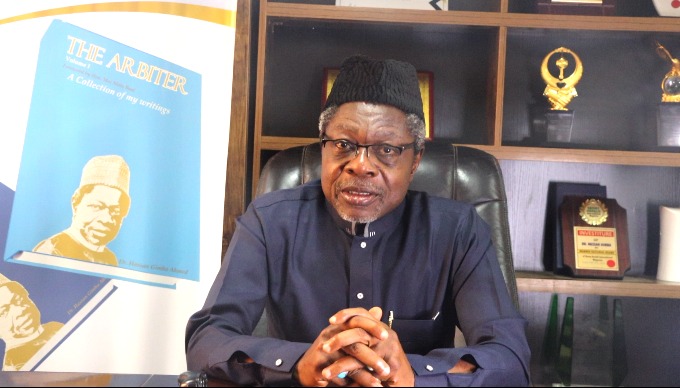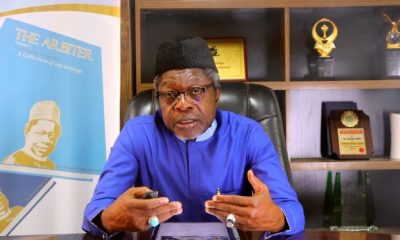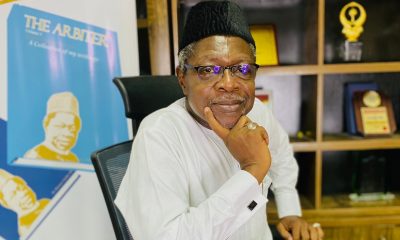Opinion
Let’s Save Our Democracy from this Axis Of Evil, by Hassan Gimba
Let’s Save Our Democracy from this Axis Of Evil, by Hassan Gimba
Several people, including Nigerian leaders, have said that democracy, as a form of government, has no better alternative. And why not, if democracy is all about a system of government in which the governed freely participate in electing their representatives?

Nigeria has had a go at practising democracy even before its independence from Britain. From independence, we practised it fully for six years, though it was the Westminster system, bequeathed to us by the colonisers. It got its name from the central London area hosting the Parliament of the United Kingdom.
The Westminster model, which Nigeria started with, is a system in which there is a head of state (or president), a prime minister who heads the government, and an elected parliament (made up of one or two houses) from which the head of government emerges.
Then, there was a thirteen-year military interregnum, during which the men in khaki and jackboots ran the country’s affairs by decree and instituting a unitary form of government, the top-to-bottom command structure they knew all too well.
Fully aware that democracy is more in tandem with human nature, the Khaki Boys organised a constitutional conference in 1979 to usher in a democratic government, opting for a presidential system fashioned after the American model.
However, it did not last as long as the parliamentary system because, four years later, the jackboots returned. It was only 15 years later, in 1999, that the starched khaki-wearing leaders freed Nigeria from their grasp after seeing that stratocracy was globally going out of fashion.
In all of our adventurism with the forms of democracy, it is only in the current dispensation that one sees politicians holding the reins of their party’s leadership, yet sabotaging it.
In the First Republic, for instance, Obafemi Awolowo was the chairman of the Action Congress (AG), while Anthony Enahoro, and later Bola Ige, were its secretaries-general. The National Council of Nigeria and the Cameroons (NCNC) had Herbert Macaulay and Nnamdi Azikiwe as chairman and secretary-general, respectively.
The Second Republic’s National Party of Nigeria (NPN) had Augustus Akinloye as its chairman, and the Peoples Redemption Party (PRP) had Alhaji Falalu Bello. In this dispensation, we have had the All Progressives Congress (APC) with Bisi Akande and Tijjani Musa Tumsah as chairman and secretary-general, respectively.
Despite the average man’s inordinate desire for worldly gains, these chairmen of the opposition political parties never took part in any subterfuge against their parties. History will surely be kind to them as those who endured being in opposition for the sake of democracy and integrity.
There is no integrity where a citizen is playing politics for his stomach. It becomes worse when he willingly sells himself to the devil so that he can own mansions, choice plots, and hefty bank accounts in various currencies. These are the sorts of people that history consigns to the dirty bin it keeps for villains and the immoral.
We may not sound the alarm over the heinous acts of the unprincipled and “long-throat” politicians if not for their desperate—and, from all indications, succeeding—shenanigans involving the judiciary that could jeopardise our democracy.
They are bent on making a mockery of the judiciary, compromising those they can compromise and shopping for favourable judgements from “understanding” or “sympathetic” judges.
As a result of this unholy romance between a triumvirate of monied politicians (whose source of wealth can lead to capital punishment in a sane country), the perfidious, unscrupulous party chieftains, and mercenary judges, Nigeria’s democracy is at risk from this “axis of evil!”
This repugnant alliance, apart from casting the courts in a bad light, is threatening to give them a role never envisaged for them by the framers of our constitution—a power superseding even that of the constitution. Now, courts are managers of political parties, telling them when to meet, who their leaders should be, who their members should be, etc. This is why those who defected from their party—whom the constitution says cease to be party members—remain in their seats courtesy of the courts. Some judgements even turn established precedents and Supreme Court rulings on their heads.
Many lawyers, too, have become willing tools in the hands of the “axis of evil,” as they have no qualms defending the indefensible under the cover of the Constitution, which deems one innocent until proven otherwise. Ordinarily, they know, we know, and everyone knows that the culprits are guilty as charged.
The law must be applied common-sensibly. As the late Gani Fawehinmi, SAN, would say, legality should be guided by morality. Any law or court that sides with the wrongdoer is not helping the country.
This is why law and order are breaking down because the criminal-minded know that even if arrested, they can meander their way out as there are clever lawyers ready to take their rotten briefs for the money and judges who would set them free for a pot of porridge. The rotten lawyers know the houses and haunts of the rotten judges… birds of a feather, they say, flock together.
Is it any wonder that the wicked no longer fear the law or the authority doling it out, or that the innocent citizen fears the outlaw more than the custodian of the law? For one, the lawbreaker knows his atrocities might go unpunished, while the law-abiding fears the law cannot protect him since he may not be able to afford it.
This is why, among many others, the sit-at-home agenda of separatists in the Southeast will continue to be obeyed.
But like almost everything, there must be a way out. Oh, sure, there must be.
The Judicial Service Commission must intervene. They must remove the rug from under the feet of renegade judges who have become turncoats. The Legal Practitioners Disciplinary Committee (LPDC) must start punishing lawyers who engage in forum shopping and other ethical breaches.
But before that, the Nigerian Law School must incorporate subjects into its curriculum to teach the importance of morality and loyalty to the Constitution and the nation.
Then the judiciary must truly be independent in all ramifications; therefore, houses, cars, and any other welfare should not be doled out to its members by the executive. These are not favours and should not be made to be so or to look like one.
Hassan Gimba, anipr, is the publisher and CEO of Neptune Prime.




